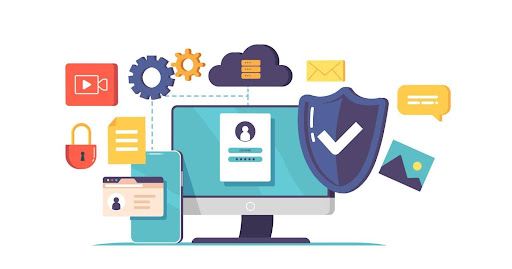Telemedicine uses innovative telecommunication technology to diagnose and treat patients. Experts expect this booming industry to attain a projected revenue growth of $3.5 billion by the end of 2022. The unprecedented convenience, incredible results, and diminished costs that telemedicine provides its patients make it one of the most widely accepted technological platforms. The technology it uses allows smooth communication and data transfer between patients and healthcare providers, including sensitive information including medical records and personal health information (PHI). Security In Telemedicine-
Fast-paced evolution in the medical sector through virtual methods is taking care of patients worldwide in a better and more convenient way. Medical practitioners have made it possible to serve patients no matter how far they may be with the right platforms and telemedicine software. However, training to use Telemedicine software integration and ensure the safe transfer of sensitive information is not easy. Data security and protecting patients’ privacy are entirely new and untraversed domains that both the academic and business world are exploring. As far as medical practitioners are concerned, they are interested in using practical software and technologies while also ensuring that the systems they implement are cost-effective in the long run.
Table of Contents
Special consideration for the deployment of telemedicine technologies
Clinical telemedicine is now finding its way into more healthcare units and clinics across the United States and is rapidly gaining prowess in the world of mainstream healthcare. There is no doubt about the vast array of benefits that telemedicine technology and services bring. Still, particular considerations need to be kept in mind while deploying these technologies. The first and foremost of these considerations is data security to ensure that your patients’ sensitive records and information stay in safe hands. Since telemedicine involves communication between medical practitioners and patients, there is a pressing need for a secure platform to share information. The Health Insurance Portability and Accountability Act places specific regulations on medical practitioners to ensure that telemedicine technology is as secure and safe as it is effective.
Keeping network security in view
The strength and security of a network are the most significant elements impacting the security of a telemedicine operation. Since data servers utilized in telemedicine software hold sensitive and confidential information, such as electronic health records, patient profiles, treatment plans, progress reports, medical prescriptions, and much more, the need for telemedicine technology to be set up on an encrypted network is paramount. An encrypted network ensures that information cannot be accessed by users outside a network and requires a username and password for login. It is imperative that the encrypted network also contains protection measures to keep hackers or intruders out, along with firewalls.
Securing of real-time communications
It is common for telemedicine practitioners to use audio or video communication to converse with patients and thus require plug-ins. This can be as dangerous as downloading a file from the internet, and the risk increases if your telemedicine platform does not have secure firewall configurations. It is advisable to opt for telemedicine platforms that are built on WebRTC technology, as it provides a secure platform for real-time communications with additional layers of security. WebRTC prevents information tampering or eavesdropping by protecting confidential patient communications using end-to-end encryption between users and DTLS and SRTP security standards. Communicating via voice or real-time video calling with the use of browser-based telemedicine platforms based on WebRTC provides the additional benefit of built-in features that address numerous security concerns. Such platforms are also less expensive.
Efficient storage of new kinds of data
All modern healthcare practices store information about patients electronically and thus have an ever-increasing patient records collection. The use of telemedicine not only adds volume to this collection but also creates additional kinds of data that need to be secured. That is because telemedicine visits can generally also include necessary medical snapshots, notes, and usual health records, medical forms, ECG or other reports, medical prescriptions, treatment plans, and several other kinds of information that need to be added to a patient’s record for treatment purposes. Storing all this information is not enough: it is legally and morally necessary to devise ways of securing these additional assets with the same amount of safeguard as the orthodox medical data. It is typically recommended to use a telemedicine platform with HL7 integration to eradicate security risks of temporary data stored on your hard drive and safely transfer it into your EMR.
Saving millions by preventing hacking of medical equipment
The growing digital world is harboring an alarming increase in the number of hackers and intruders. With the world steadily transforming into a global village, the frequency and kind of ransomware and hacking attacks are increasing by the minute. Getting cyber insurance is not a cheap endeavor; it requires millions depending upon your technical circumstances. If hacked or trespassed, medical equipment and machinery can cause millions of dollars in damage and may even instigate legal complications in case sensitive data gets leaked. Hackers may also ask for ransom in exchange for confidential information stored on servers, which can cause a massive headache. Therefore, the most effective approach to preventing these gigantic complications is by using a credible and secure telemedicine platform. It may cost a bit, but it is essential to keep in mind that dealing with intruders inside your telemedicine network surpasses the cost of building up cyber security walls. A secure network pays off in more ways than you can count, and a lack thereof can subsequently pose unimaginable complications.
How to Choose the Best Telemedicine Software
Organizational needs
Keeping in mind the needs and the scope of your organization there are many different Telemedicine software that you can use. It must ensure service speed, and be free of external and internal defects. Before choosing a Telemedicine vendor, is it important to figure out what your organization’s requirements are? Do you need software that has widespread outreach, or are you trying to target a particular location?
Devices and Connectivity
Another important aspect to consider is how the software will connect and what kind of devices will be used. This has been addressed even from a patient’s point of view. Electronic devices such as mobile phones, tablets, and laptops make it easier for doctors, physicians, and other healthcare professionals to reach their patients and communicate with them effectively.
Costing of the software
Another important factor to consider is the total cost of the available Telemedicine software, the return on investment ratio, and the overall cost analysis. software that helps you connect with patients and carries zero risk is the ideal choice for most organizations and hospitals looking to invest in Telemedicine software.
Added services and customer support
The ideal Telemedicine software will allow users to connect with their patients effectively while providing excellent services to improve the healthcare delivery system. The software should be flexible and adjustable with a channel for reliable in-person services as well.
Here is a list of services that Telemedicine software provides.
- Tutorials for both patients and healthcare professionals
- Easy access
- Video, audio, and message services
- Software assistance
- Quick response system for technical issues, glitches, etc.
- Quick upgrades to resolve existing issues
- A diversity of healthcare tools provided
- Data security for patients
Telemedicine software must be suitable for integration with users across different channels. The dynamic quality of software, especially for Telemedicine software is important because it allows you to enhance service delivery and speed up processes in the healthcare system.
Ensuring that the Telemedicine software is secure is of utmost importance. The vendor should be consulted regarding the fulfillment of the different rules, privacy policies, HIPAA compliance measures that will ensure your software is in agreement with the data security standards in place, FDA approvals are also important for any software or Telemedicine platform to become mainstream. Organizations should check for these details when deciding which Telemedicine software is the secure one.
HIPAA Certificate
The Health Insurance Portability and Accountability Act’s (HIPAA) approval means that any sensitive patient data is safe. This certificate allows you to communicate using Telemedicine software while providing secure communication channels to patients protected from external non-medical software. The essential records can be extracted for medical consultation purposes.
Telemedicine security at Cura4U
Experts at Cura4U are at par with the changing world dynamics and aware of the paramount threats posed by hackers and technological intruders around the globe. Therefore, Cura4U’s telemedicine platform is integrated with specialized cybersecurity layers that ensure maximum security of confidential information that our patients trust us with. Head over to Cura4U to get to know more about our expert-level medical services provided at the lowest possible prices!
Conclusion
With the right Telemedicine software, we can ensure that hundreds and thousands of lives are saved in this ongoing struggle against the virus. A Telemedical file is an electronic history of the patient’s health. The prescriptions are electronic and the medical data is also sensitive. The world has seen many hacking attempts of the health sector with the increased reliance on Telemedicine software. This only goes to show that the need for better, more advanced software is nigh. Medical data processing can be made a lot more secure with the right software and the right systems in place for the Telemedicine revolution.





